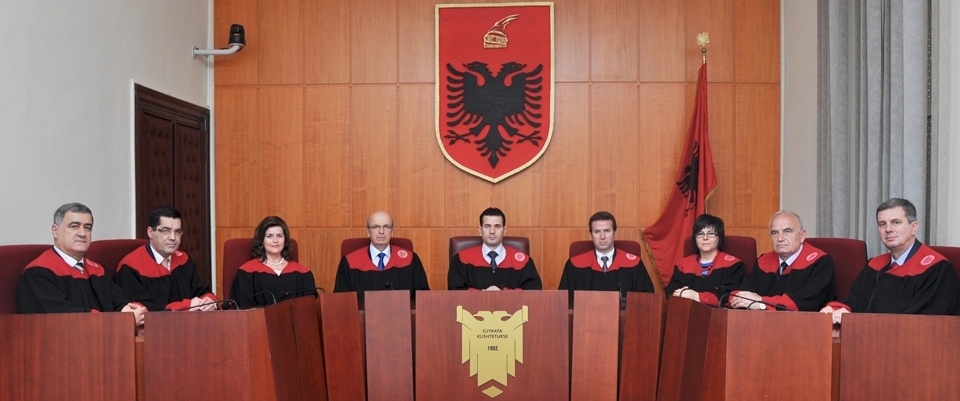
Although the Independent Qualification Commission (KPK) found several red flags in Constitutional Court judge Bashkim Dedja’s wealth declarations, the latter has successfully passed his vetting. The KPK, comprised of Valbona Sanxhaktari, Roland Ilia, and Xhensila Pine, announced its verdict yesterday.
Bashkim Dedja was not present in the hearing, but he was being represented by attorney Maks Haxhia, the same attorney that is defending former Minister of Interior Affairs Saimir Tahiri regarding his alleged involvement with the Habilaj brothers’ drug trafficking gang and who is part of the steering committee of EURALIUS.
Haxhia went so far as to attack the case’s relator, Xhensila Pine, immediately following the announcement of the ruling, claiming that she had violated the law during the hearing by commenting on the fact that Dedja could not justify his wealth and the irregularities in his file.
Specifically, the irregularities concerned three apartments owned by Bashkim Dedja:
To purchase a 146-sq.m. apartment in Tirana, Dedja claimed that he had taken out a €120,000 loan, used his €35,000 savings, and borrowed €15,000 and €10,000 from his brother and his brother-in-law, respectively. The KPK administrative investigation has concluded that Dedja’s brother and brother-in-law were unable to justify these savings.
Dedja’s statements regarding the people he borrowed money from are also suspicious. He claimed that he borrowed money from his brother-in-law, and, afterwards, from the father of his brother-in-law. Furthermore, the notarized statements concerning the borrowing were problematic – his brother-in-law, one of the lenders, had not signed.
Regarding this case, defense attorney Haxhia claimed that both lenders had been immigrants and, as every other Albanian immigrant, they lacked some documentation to justify their savings.
KPK found other irregularities with another 98-sq.m. apartment located in Tirana. Initially, in 2003, Dedja said that he owned only 50% of the apartment, and his brother owned the rest. Afterwards, when filing vetting documentation, Dedja declared that he owned the entire apartment, without providing any proof of purchase. Subsequently, the judge switched positions again, going back to the initial version.
KPK also raised doubts regarding the various declarations Dedja filed with the High Inspectorate of the Declaration and Audit of Assets and Conflict of Interest (ILDKPKI) for an apartment on Durrës beach. The electricity contract for this property has been registered to judge Dedja, but the registered owner of the apartment seems to be Dedja’s brother, a farmer living in a village in Dibra.
Attorney Haxhia waved all these irregularities away, dismissing them as “this is how relations among brothers are in Albania.”
It thus appears that the Independent Qualification Commission is operating on a double standard. In the cases of other judges, a mere whiff of suspicious activity has been enough for KPK to dismiss them.
Fatmir Hoxha, another Constitutional Court member, was dismissed by KPK as he wasn’t able to justify a €28,500 loan from his brother-in-law used to purchase a house in Tirana, in 2011. KPK also labelled as irregular a figure of 330,000 lekë figure, which, according to Hoxha, was an error on his first ever declaration of wealth.
Constitutional Court member Altina Xhoxhaj was dismissed on the grounds that, in 2003 (when they were not yet affiliated) her partner had bought, with his own savings, an apartment that he then registered, in 2005, in both their names, as they had begun living together.
Though Xhoxhaj provided KPK with her partner’s wealth documentation from 1992 to 2001, it was not taken into consideration.
KPK also found a 12.14-sq.m. discrepancy in the declared square surface of an apartment in Gjiri i Lalzit, purchased in 2011.
KPK also concluded that the judge’s income could not justify expenses amounting to 1.9 million lekë during the years 2007, 2009, and 2015
The fact that Bashkim Dedja has passed the vetting has now become a ground for questioning the validity of entire vetting process. If for comparable “offenses” some judges are reconfirmed and other are dismissed, what value does the vetting process still have?
The right course of action would for one of the two Public Commissioners to file an appeal at the Appeal Chamber, addressing these issues of inequality before the law.

